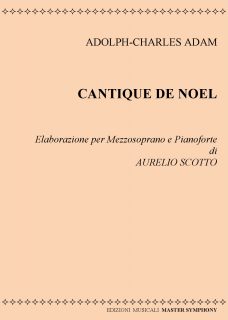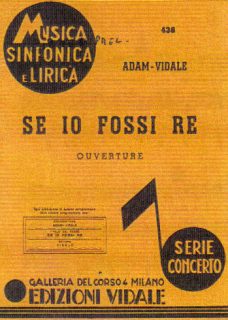-
7,00€ Iva Inclusa

CANTIQUE DE NOEL
7,00€ Iva InclusaCANTIQUE DE NOEL
per mezzosoprano e pianoforte
elaborazione da Adolphe – Charles Adam (1803 – 1856)Commissione dell’Accademia del Teatro del Maggio Musicale Fiorentino -
100,00€ Iva Inclusa

SE FOSSI RE “SI J’ETAIS ROI” Sinfonia dall’Opera
100,00€ Iva InclusaSE FOSSI RE
“Si j’étais roi” è un’opera-comique in tre atti di Adolphe Adam, su libretto di Adolphe d’Ennery e Jules-Henri Brésil. La prima rappresentazione è avvenuta a Parigi al Théâtre Lyrique (Théâtre-Historique, Boulevard du Temple) il 4 settembre 1852 ed ha raggiunto più di 170 spettacoli nei suoi primi dieci anni.
La trascrizione per Concert Band è stata curata da Massimo Picchioni
-

THE HOLLY CITY per Voce, Coro e Orchestra
The Holy City è una ballata di origine Vittoriana, datata 1892, scritta da Michael Maybrick sotto lo pseudonimo di Stephen Adams. Si dice che un cantante lirico, arrestato per frode, iniziò a cantarla, e alcuni detenuti nella cella accanto caddero sulle loro ginocchia appena iniziò la prima strofa: in seguito il giudice decise di rilasciarli senza pena, poiché dalla canzone avevano imparato la lezione. Questo brano è citato nell’Ulisse di Joyce, e la melodia è utilizzata in “Black and tan fantasy” di Duke Ellington.
Scritta originariamente per voce solista e pianoforte, è qui arrangiata per voce, coro e orchestra sinfonica.The Holy City is a religious Victorian ballad dating from 1892, with music by Michael Maybrick writing under the alias Stephen Adams, with lyrics by Frederic Weatherly.
The song is recorded in the African Methodist Episcopal Church Review in 1911 as having been sung by an opera singer awaiting trial for fraud in his cell while a group of men arrested for drunk and disorderly conduct were before the judge. The men were said to have dropped to the knees as the song began ‘Last night I lay a-sleeping, There came a dream so fair.’, the lyrics contrasting with their previous night’s drunkenness. The song’s conclusion resulted in the judge dismissing the men without punishment, each having learned a lesson from the song.
The song is mentioned in James Joyce’s Ulysses, published 1918-1920. The melody formed the basis of a Spiritual titled Hosanna, which in turn was the basis for the opening of Duke Ellington’s Black and Tan Fantasy.
Originally written for voice and piano, here is an arrangement for voice, choir and symphonic orchestra.
- Home
- Negozio
- Musica per Banda
- Orchestra Sinfonica
- Commedie e Favole Musicali
- Didattica e Teoretica
- Altre Pubblicazioni
- Edizioni PUCCI in sola partitura
- Accessori
- CD
- Noleggio/Rental
- Free Download
- News
- Contatti



